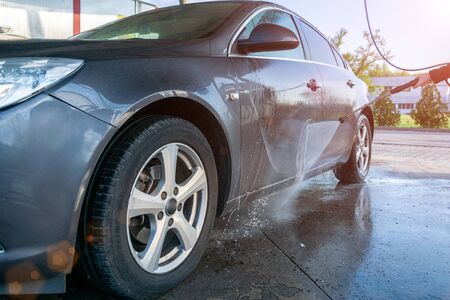1. Introduction
When shopping for an SUV, one of the biggest decisions youll face is whether to go for a luxury brand or a mainstream option. Luxury SUVs often come with premium materials, advanced technology, and a prestigious brand name, but they also come with a significantly higher price tag. On the other hand, mainstream SUVs have improved dramatically over the years, offering many high-end features at a more affordable price. So, is the extra cost of a luxury SUV worth it? Lets take a closer look at the differences between luxury and mainstream SUVs to help you decide.
Luxury vs. Mainstream SUVs: Key Differences
Before diving into whether a luxury SUV is worth the premium price, its essential to understand the key differences between luxury and mainstream models. Below is a quick comparison:
| Feature | Luxury SUVs | Mainstream SUVs |
|---|---|---|
| Price Range | $50,000 – $150,000+ | $25,000 – $60,000 |
| Interior Materials | Premium leather, wood, aluminum | Cloth, synthetic leather, plastic |
| Technology | High-end infotainment, digital clusters, advanced driver aids | Basic to mid-level tech, fewer luxury features |
| Performance | Powerful engines, smoother ride, adaptive suspension | Balanced performance, less emphasis on power |
| Brand Prestige | Exclusive, status symbol | Reliable, practical |
| Resale Value | Varies (some brands hold value well) | Tends to depreciate slower |
Why Do Luxury SUVs Cost More?
A major factor influencing the higher cost of luxury SUVs is the attention to detail in design, comfort, and technology. Luxury vehicles often feature handcrafted interiors, cutting-edge safety technologies, and smoother, quieter rides due to superior engineering and sound insulation. Additionally, luxury brands invest heavily in branding and exclusivity, making their vehicles a symbol of success. However, many mainstream SUVs now offer premium-like options, blurring the line between the two categories.
Mainstream SUVs Are Becoming More Luxurious
Several mainstream automakers have stepped up their game by introducing high-end trims with luxury-like features. For example, brands like Toyota, Honda, and Ford now offer premium trim levels with leather upholstery, panoramic sunroofs, and advanced infotainment systems, bringing luxury elements to more budget-friendly models. This has made the decision between luxury and mainstream SUVs more challenging, as the gap in features and comfort has narrowed.
What to Expect in the Next Sections
In this guide, well dive deeper into areas like comfort, technology, reliability, and overall value to determine whether spending extra on a luxury SUV is truly worth it. Stay tuned as we explore each aspect in further detail!
2. Performance and Driving Experience
When deciding between a luxury and a mainstream SUV, performance and driving experience play a crucial role. Luxury SUVs often promise more power, refined handling, and advanced driving technologies. But does the premium price translate to a noticeably better ride? Lets compare both categories.
Engine Power and Acceleration
Luxury SUVs typically come with more powerful engines and smoother transmissions, providing quicker acceleration and effortless highway driving. Many luxury models offer turbocharged or hybrid powertrains for enhanced performance. On the other hand, mainstream SUVs prioritize fuel efficiency and affordability, sometimes sacrificing horsepower for daily practicality.
| Feature | Luxury SUV | Mainstream SUV |
|---|---|---|
| Engine Options | Turbocharged, V6, V8, or hybrid | Inline-4, V6, or basic hybrid |
| Acceleration (0-60 mph) | Often under 6 seconds | Usually 7-9 seconds |
| Towing Capacity | Higher towing capacity | Moderate towing capacity |
Handling and Ride Comfort
Luxury SUVs are designed for a more refined driving experience. They often come equipped with adaptive suspension systems, high-performance brakes, and precise steering for superior handling. Mainstream SUVs, while comfortable, may not offer the same smoothness, particularly over rough roads.
| Feature | Luxury SUV | Mainstream SUV |
|---|---|---|
| Suspension System | Adaptive air suspension, adjustable ride modes | MacPherson strut, multi-link suspension |
| Road Noise | Minimal due to sound insulation | Moderate road noise |
| Ride Smoothness | Exceptionally smooth, soft ride | Can feel bumps more |
Advanced Driving Features
Luxury SUVs often come equipped with cutting-edge driver assistance technologies, such as adaptive cruise control, semi-autonomous driving, and advanced all-wheel-drive systems. While mainstream SUVs have made significant improvements, they typically include fewer high-end features unless opting for top trims.
| Feature | Luxury SUV | Mainstream SUV |
|---|---|---|
| Adaptive Cruise Control | Advanced with stop-and-go, lane centering | Basic version, may lack stop-and-go |
| Autonomous Driving Features | Available on some high-end brands | Rarely available |
| Off-Road & AWD Capabilities | High-performance AWD systems | Standard AWD or basic 4WD |
Overall, if you prioritize strong engine power, smooth handling, and the latest technology, a luxury SUV will likely deliver a superior experience. However, many mainstream SUVs still offer a reliable and comfortable drive, making them a solid choice for budget-conscious buyers.

3. Interior Quality and Technology
When it comes to the interior, the differences between luxury and mainstream SUVs become quite apparent. The materials, craftsmanship, and technology found inside a luxury SUV are often far more refined compared to what you’ll find in a mainstream counterpart. But do these upgrades justify the higher price tag? Lets break it down.
Materials and Craftsmanship
Luxury SUVs often come with higher-quality materials such as premium leather upholstery, genuine wood trim, and aluminum accents. Mainstream SUVs, on the other hand, typically use cloth seats, synthetic leather, and plastic trim. The attention to detail in a luxury vehicle is also superior, with finer stitching, soft-touch materials, and better noise insulation for a quieter cabin.
| Feature | Mainstream SUV | Luxury SUV |
|---|---|---|
| Seat Material | Cloth or Synthetic Leather | Premium Leather |
| Trim | Plastic with Some Soft-Touch Surfaces | Genuine Wood, Aluminum, or Carbon Fiber |
| Noise Insulation | Basic Soundproofing | Advanced Acoustic Glass and Soundproofing |
Infotainment and Technology
Tech features have become a major selling point for SUVs, and luxury brands often lead the way. Most luxury SUVs come with larger touchscreens, premium sound systems, and more advanced driver-assist features. While mainstream SUVs have improved in this area, luxury models still offer a more seamless and high-end experience.
| Technology Feature | Mainstream SUV | Luxury SUV |
|---|---|---|
| Infotainment System | Smaller Touchscreen with Standard Audio | Large High-Resolution Display with Premium Audio |
| Navigation | Basic GPS or Smartphone-based | Advanced Built-in Navigation with Real-time Traffic |
| Driver Assistance | Basic Safety Features | Advanced Semi-Autonomous Driving Systems |
Luxury Amenities
Luxury SUVs come packed with features aimed at improving comfort and convenience. Options like ventilated and massaging seats, panoramic sunroofs, advanced climate control, and rear-seat entertainment systems make the driving experience far more upscale. While some higher-end mainstream SUVs offer a few of these perks, they aren’t as common or as refined as in luxury vehicles.
4. Ownership Costs and Depreciation
Analyzing the Total Cost of Ownership
When deciding between a luxury SUV and a mainstream SUV, the initial purchase price is just one part of the equation. The total cost of ownership includes maintenance expenses, fuel efficiency, depreciation, and insurance costs. Luxury SUVs typically come with higher ownership costs, but do they provide enough value to justify the premium?
Maintenance Expenses
Luxury SUVs often require specialized maintenance, premium-grade parts, and dealership servicing, which can drive up costs. On the other hand, mainstream SUVs have more affordable repair costs and wider availability of parts, making them less expensive to maintain over time.
| Category | Luxury SUV | Mainstream SUV |
|---|---|---|
| Annual Maintenance Cost | $800 – $1,500 | $400 – $800 |
| Part Replacement Costs | Higher | Lower |
| Dealer Servicing | More Expensive | More Affordable |
Fuel Efficiency
Another factor to consider is fuel economy. Luxury SUVs often offer powerful engines and advanced performance features, but they may consume more fuel compared to mainstream SUVs. Some luxury models have hybrid or electric options, which can mitigate fuel costs, but mainstream SUVs generally provide better fuel efficiency across the board.
| SUV Type | Average MPG (Miles Per Gallon) |
|---|---|
| Luxury SUVs | 15 – 25 MPG |
| Mainstream SUVs | 20 – 30 MPG |
Resale Value
Depreciation hits luxury SUVs harder than mainstream SUVs. While some premium brands retain their value better than others, luxury vehicles generally lose a larger percentage of their value over time. Mainstream SUVs, particularly those from reliable brands, often have better long-term resale value.
| Category | Luxury SUV | Mainstream SUV |
|---|---|---|
| 5-Year Depreciation | 50% – 65% | 40% – 55% |
| Resale Demand | Selective Market | Broader Appeal |
Final Thoughts on Cost Considerations
Both luxury and mainstream SUVs come with advantages and trade-offs in terms of ownership costs. If you prioritize lower maintenance expenses, fuel efficiency, and better resale value, a mainstream SUV might be the smarter choice. However, if youre willing to pay extra for premium materials, advanced technology, and a prestigious brand name, a luxury SUV could still be worth it.
5. Conclusion: Is the Premium Price Worth It?
When deciding between a luxury SUV and a mainstream SUV, the key question is whether the premium price is justified by the added benefits. Luxury SUVs offer top-tier materials, advanced technology, and a prestigious brand name. On the other hand, mainstream SUVs provide excellent reliability, modern features, and a more budget-friendly price.
Key Differences Between Luxury and Mainstream SUVs
| Feature | Luxury SUVs | Mainstream SUVs |
|---|---|---|
| Price | Higher – premium models often start above $50,000 | More affordable, usually between $25,000 and $45,000 |
| Interior Quality | High-end materials like leather, wood, and premium stitching | Good quality, but more focus on durability over luxury |
| Technology | Cutting-edge infotainment, advanced driver assistance systems | Modern tech features, but may lack premium innovations |
| Performance | More powerful engines, smoother suspension, enhanced handling | Reliable performance, but less emphasis on power and comfort |
| Brand Prestige | Considered a status symbol | More focused on functionality and practicality |
Who Should Buy a Luxury SUV?
A luxury SUV might be worth the investment if you prioritize high-end materials, cutting-edge technology, a refined driving experience, and the prestige associated with luxury brands. It’s ideal for those who enjoy premium features, exclusivity, and top-quality craftsmanship.
Who Should Stick with a Mainstream SUV?
If you value affordability, reliability, and practicality over luxury, a mainstream SUV is a great choice. Many mainstream models come with advanced features and comfortable interiors, making them an excellent option for buyers who want a great vehicle without the extra cost.
Final Thoughts
Ultimately, the decision comes down to personal preferences and budget. Luxury SUVs undoubtedly offer a more refined experience, but mainstream SUVs provide excellent value and practicality. Carefully consider which features matter most to you before making a decision.


